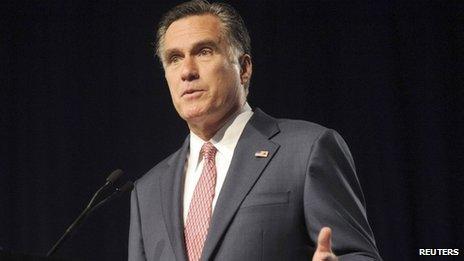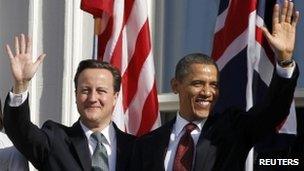Romney faces Olympic test in London
- Published
- comments

Mitt Romney is to visit Britain, Israel and Poland on his first foreign visit as a Republican presidential candidate
There is one competitor arriving in London this week who will not know if he has got the gold until later this year.
For Mitt Romney, external, the man standing against US President Barack Obama in the autumn presidential election, silver and bronze will not cut the mustard.
But in comments attributed to a Romney adviser by a British newspaper on Wednesday, Team Romney may have tripped up even before the starting gun has even fired.
Such are the dangers of such foreign tours.
The whole visit - to London, Israel and Poland - is fraught.
Of course, his Olympic break does not mean Mitt Romney is coasting home, so super-confident that he can take time off from from campaigning. After all, it is meat and drink for lazy journalists to attack politicians for swanning off abroad when they should be hard at work, external on behalf of their country.
But for Mr Romney, Britain is the first leg of a trip that has been carefully designed for, external an audience at home, pushing several messages.
'Anglo-Saxon heritage'
The one message he did not want to emerge is what is being interpreted as an attack on Mr Obama's race.
Eager to declare that Mr Romney would be friendlier than President Obama to Britain, an unnamed adviser has been quoted in the Daily Telegraph as saying, external: "We are part of an Anglo-Saxon heritage, and he [Romney] feels that the special relationship is special...

Prime Minister David Cameron praised President Barack Obama on a recent visit to Washington
"The White House didn't fully appreciate the shared history we have."
This is being seen by some as not far short of a racial slur on Mr Obama and, as a Daily Telegraph blogger (no friend to the Obama administration) rightly points out, external, it is the sort of stuff that sticks. It is not what Team Romney hoped for.
They are awkward things, words. Better let the pictures do the talking.
The idea for this trip must have been that simply seeing Mr Romney in an Olympic setting would remind potential voters of what many would see as his greatest achievement, external: turning around the Salt Lake City Winter Olympics in 2002.
Although some suggest Mr Romney has reason to be shy, external of boasting too much, he apparently used his business skills and a certain amount of flair to save an event that was deep in trouble: over budget and, in the minds of many, headed towards a failure that would humiliate America.
By a combination of some pretty brutal cuts - including scrapping free buffets for dignitaries and making them buy their own pizza - and a certain amount of boosterism, he turned looming tragedy into triumph.
'High-grade small-talk'?
It is a handy past for a man whose main message is that he can do the same for the American economy.
It does not end there. Although there is no doubt the upcoming election is all about the economy, anyone who wants to be president has to demonstrate that they are ready and confident to take the helm of the world's only superpower.
As the "Anglo-Saxon" quote has already proved, though, while many voters may not care too much, the media and opponents will make hay with any slip. "Gotcha moments" need not be fatal but they do not help, external in a tight race.
So, Mr Romney filled his British dance card to the full, scheduling meetings with former PM Tony Blair, opposition leader Ed Miliband, as well Foreign Secretary William Hague, Chancellor George Osbourne, Deputy PM Nick Clegg and, last but not least, the prime minister.
I am sure their meeting will consist of little more than high-grade small talk. But it would be fascinating to get a real debate going between the two men. After all, David Cameron has been effusive in his praise for Mr Obama's foreign policy, praising his strength, moral authority and wisdom, saying he had found a new voice for the American people.
But it is a central part of Mr Romney's pitch that Mr Obama's voice is the wrong one.
It is a vital part of this tour's message: that Mr Obama is weak abroad and has let down America and the world, acting as a friend to its enemies and an enemy to its friends.
Before leaving for the UK, Mr Romney made his first major foreign policy speech, external.
He proclaimed: "If you do not want America to be the strongest nation on earth, I am not your president. You have that president today," and accused Mr Obama of diminishing American leadership.
The two other legs of Mr Romney's tour are designed to underscore this narrative. His representatives say he has chosen to visit the UK, Israel and Poland because the countries are "three pillars of liberties".
Those of a cynical disposition might point out that Jewish and Polish voters are also pillars of the American electorate (Mr Obama also made a point of visiting Poland after his state visit to Britain).
But Mr Romney's case is that Mr Obama has undermined Israel and supported its enemies.
Then there is Poland. When Mr Romney declared that the US' greatest geopolitical enemy was Russia it raised quizzical eyebrows at home. But some in Poland would agree that the bear is still the threat it always was.
Relations with Russia are just one example of Mr Romney's arguments that Mr Obama has given too much ground, been soft and avoided necessary confrontations.
Mr Obama's former press secretary Robert Gibbs says the Romney trip will be "one long photo-opportunity". He contrasts it with the news conferences given by candidate Obama in 2008 when he visited Europe. Mr Gibbs is, of course, hyper-partisan; but he has a point.
Mr Romney's major foreign policy speech raises as many questions as it answers: we are not certain how President Romney would act differently, rather than just talk differently.
Mitt Romney: "If you don't want America to be the strongest nation on earth, I am not your president"
For instance, he criticises President Obama's decision to withdraw surge troops from Afghanistan, calling it "a politically timed retreat" and "the route to more war - and to potential attacks here at home".
But Mr Romney states that his goal is to hand over control to Afghan forces by 2014 - exactly Mr Obama's policy.
On Iran and the nuclear issue, he says all the talking has come to naught. "I pledge to you and to all Americans that if I become commander-in-chief, I will use every means necessary to protect ourselves and the region, and to prevent the worst from happening while there is still time".
But it is not clear how that is different to Obama's policy not to take the use of force off the table.
I am travelling on the plane with Mitt Romney when he leaves Britain. I hope, if not expect, to get some answers over the next few days - and indeed to ask him his thoughts on his Anglo-Saxon heritage.